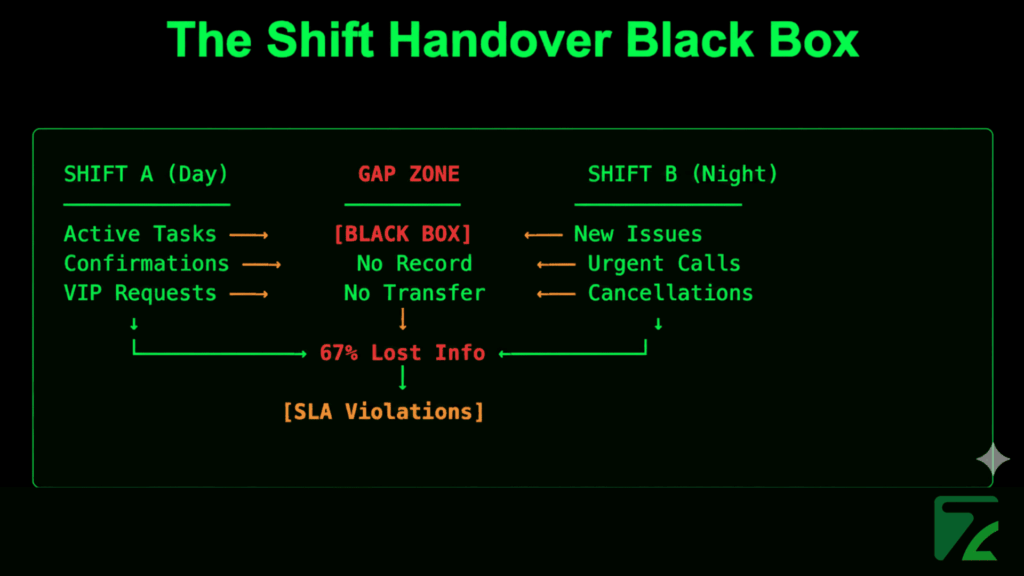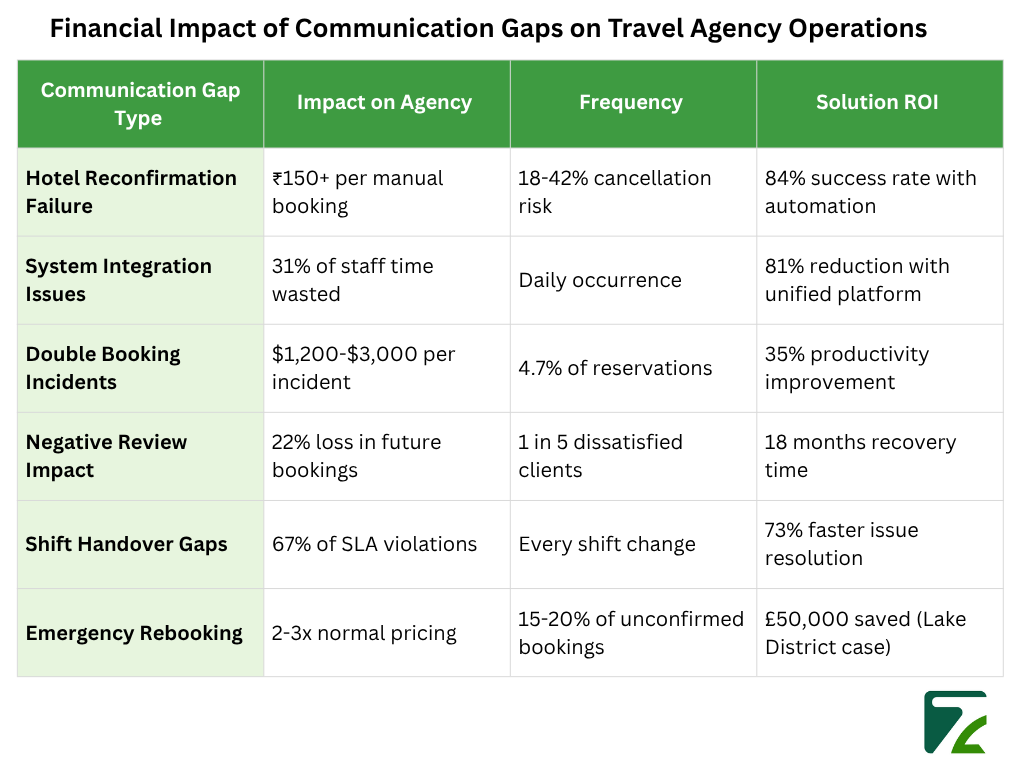Imagine this: A high-end travel agency misses out on a $50,000 group booking in Santorini because the message from their ground operator about their hotel being overbooked never made it to the appropriate team member. Upon arrival, the clients discovered no rooms were available, turning into a social media disaster and potential lawsuit. And this scene replicates itself daily at travel agencies everywhere, where cracks in communication silently eat away at profits, reputation and client confidence.
In travel operations, communication gaps are characterized by the loss of information between team members, departments or suppliers (including clients). These informational blind spots are the result of key booking information, changes to an itinerary and time-sensitive updates not hitting the right person at the right time. Indeed, when you’re a travel company handling hundreds of simultaneous bookings, across countless time zones, suppliers and points of contact, the slightest confusion can spiral rapidly into several operational nightmares at once.
Today’s travel agencies touch 7-12+ disparate technology systems every day. Your reservations team uses Amadeus or Sabre, operations deals with suppliers via one portal, finance uses another. In the meantime, sales logs client touches in Salesforce and accounting processes payments via two more systems. Agencies use more than one system of record with a discrete amount of data, which needs to be integrated and centrally managed
Every platform is a silo, creating dangerous communication gaps where critical information gets trapped Think about how something as basic as a flight time change can navigate its way through this maze: The airline tells you through the GDS, yet your operations department doesn’t immediately inform that ground transfer supplier in turn via its other portal and clients suffer the embarrassment of no-show pickups.

Travel doesn’t sleep, but your staff does. When you switch shifts, critical client needs, outstanding problems and supplier-related information tend to disappear into the vacuum between the team on its way out and the new guys. These changes can be particularly inconvenient for travel agencies that will do everything to prevent lost bookings at all costs. Handover protocols are not standardized, and situations that require an urgent follow-up like visa issues or medical emergencies become lost with a breakdown in communication that affects client safety.
Operations at a global level involve working with supply partners across continents who communicate in their own individual ways and have local differences in language. When a “gentle reminder” email from your team in Mumbai is sent to a German hotelier who prefers direct contact, these small divergences amount to large informational chasms between the two of you that slow down confirmations and irritate guests
The hotel reconfirmation process is one of the most crucial yet unsung communication gaps. Overbooking occurs when hotels occasionally accept more reservations than they have rooms available in the hopes of last-minute cancellations, which can leave travelers stranded at check-in
The very process of reconfirmation is filled with such lapses in communication. Staff are waking up at unhealthy hours to call hotels in different time frames (and) it is tiring for them and exhausting the level of work they are able to deliver. It takes more than ₹150 for agency to reconfirm manually and automated systems will drive this down to sub- ₹20.
The most apparent evidence of communication lapses come in the form of double bookings. The scenario seems all too common: A guest at your property is in town after organizing a long overdue vacation with family and friends, only to discover their hotel room has been double-booked. Industry data cites that agencies see around 4.7% of all reservations impacted by double booking situations whereby each will accrue an average cost of $1,200-$3,000 cash in resolution costs or lost business.
The financial burden does not stop at this one incident. Statistically, you will lose 22% of all your future bookings from just 1 bad review When things go wrong with hotel bookings due to communication gaps emergency new booking costs can frequently end up being 2 or even 3x the normal cost and this directly impacts your bottom line.

Each communication failure eats away at client confidence. In the social media era, a single miscommunication can lead to an outbreak of viral negative reviews. According to travel agencies, it takes about 1.5 years and $45,000 of damage control for an organization to recover from a widely communicated failure!
Business operations conducted worldwide require communication to overcome language barriers, however, most have been forced to use ad-hock translations that result in dangerous ambiguities. Language barriers are a multiplier of the communication gap when “immediate confirmation required” means “confirmation appreciated soon” in another language.
Structured Multilingual Messaging library will fill the void:
Essential Template Structure:
This template process eliminates miscommunication 62% faster on average and quicker lead times by approximately 4 hours.
Agencies require structured recovery protocols when a communication failure fractures the client relationship. Studies indicate that 76% of clients who have a problem professionally – managed service recovery are even more loyal than if the blunder had not occurred.
By enrolling in a consolidated data-based platform, you optimize booking, reporting and customer handling processes as well as this can work on your behalf with automation cutting down the manual workflow and adding more accuracy to current travel. Agencies at the forefront choose single platform solutions that bring together:
Smart recommendations to assist agents may be provided by intelligent automation and it can keep the customer conversation nonstop, which will result in not much delay in response times .AI observes communication frequency and notifies management when important to messages are left unattended. Through machine learning, potential risks of double bookings and/or conflicts in the information are detected across communication immediately.
The most effective remedy for preventing communication breakdowns is through automated hotel booking reconfirmation. Going forward hotel booking reconfirmation systems use a structured approach to check the details of reservation prior arrival of guest with 84% success ratio across industry and ROI in less than 3-6 months.
“Lake District Hotels implemented the reconfirmation system for their 6 properties, attained saving of over £50000 on prevented cancellations, saved more than 500 dining covers and observed a reduction in booking uncertainty rate by 70%.
Eliminate shift-change communication gaps through:
Digital Handover Requirements:
Time stamp all entries for accountability and generate searchable archives to aid in pattern analysis.
Monitoring tools deliver real time information about supplier and airline developments to agencies, facilitating early issue resolutions.
Dashboards should display:
Optimal Reconfirmation Schedule:
You should consider the following when choosing what communication tool to use:
Monitor these KPIs to track your progress:
Communication disconnects in travel operations aren’t just little irritants, they’re profit-deteriorating loopholes that set agencies back thousands of dollars each day. The dividing line between successful and merely existing is not very far, it’s a matter of sustaining non-stop information flow among all those who contribute to your business.
Automated marketing messages can simplify the communication of on-the-fly travel changes for both agency and client, promptly alerting travelers when their flight is canceled or rescheduled or itineraries change.
The solutions offered from multilingual templates to automated hotel reconfirmation are not just Theoretical ideas but successful tactics changing travel agencies everywhere. Real case studies from agencies demonstrate average increase in productivity of 35% with less errors
Start with one key area: maybe you initiate automated hotel reconfirmation which brings your ₹150 per booking cost down to under ₹20 or standardized delivery SLAs reducing 67% of all breaches. Measure the impact, build momentum and then scale systematically.
The issue is not whether to address communication breakdowns, but how quickly you can put new solutions in place before the next expensive miscommunication occurs. When it is done right, agencies are reporting 84% of confirmations achieved and ROI in the region 3-6 months.
Want to help bridge those communication gaps in your travel program? Visit Zeal Connect. to see how our automated products have helped 500+ agencies cut operational mistakes in half and increase client satisfaction scores by 41%.
This usually happens due to communication gaps between the travel agency and the hotel, system integration failures, or delays in updating booking platforms. Misaligned data or missed reconfirmations often leave hotel staff unaware of reservations.
Agencies can implement automated reconfirmation systems, centralized communication platforms, and standardized messaging protocols. Proactive updates for itinerary changes, cancellations, and special requests ensure all stakeholders are informed on time.
Integration failures occur when different platforms (GDS, hotel portals, airline systems) use incompatible formats, lack real-time syncing, or aren’t updated consistently. Limited technical resources and manual data entry also contribute to mismatches.
Double bookings often result from delayed updates across multiple systems, manual coordination errors, or poor internal communication during high-volume periods. Without automated syncing or alerts, multiple agents may confirm the same inventory.
Clients may stop responding when updates are delayed, inconsistent, or unclear. Miscommunication or lack of proactive outreach reduces confidence in the agency, potentially harming client relationships and future bookings.

Travel Automation Expert